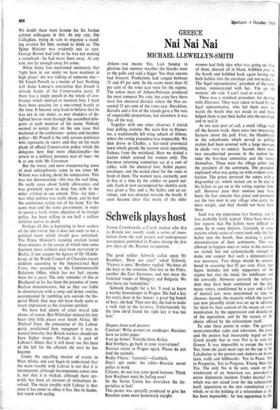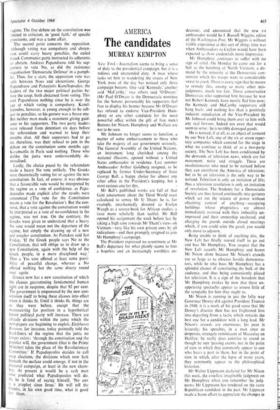Nai Nai Nai
GREECE MICHAEL LLEWELLYN-SMITH
Athens—NAT means Yes. Last Sunday in glorious late summer weather the Greeks went to the polls and said a bigger Yes than anyone had forecast. Predictions had ranged between 75 and 85 per cent. In the event more than 92 per cent of the votes cast were for the regime. The urban mass of Athens-Peiraeus produced the most compact No vote, but even here there were few electoral districts where the Nos ex- ceeded 25 per cent of the votes cast. Heraklion, Kavalla and a few of the islands gave a No vote of respectable proportions, but elsewhere it was Yes all the way.
Together with one other observer, I visited four polling stations. We went first to Hymet- tos, a traditionally left wing suburb of Athens, where the voting procedure was impeccable. We then drove to Chalkis, a fair-sized provincial town which guards the narrow strait separating Euboea from the mainland. Here we visited a station which catered for women only. The five-man returning committee sat at a row of tables, with the electoral lists, ballot papers, envelopes, and the sealed chest for the votes in front of them. The women were, correctly, sent in five at a time by the soldier on guard out- side. Each in turn surrendered her identity card, was given a Yes and a No ballot and an en- velope, and was directed towards the booth. It soon became clear that many of the older women had little idea what was going on. One of them, dressed all in black, hobbled over to the booth and hobbled back again having put both ballots into the envelope and not sealed it. The 'legal representative,' president of the com- mittee, remonstrated with her. 'I'm an old woman,' she said. 'I can't read or write.'
There was a standard procedure for dealing with illiterates. They were taken in hand by the
legal representative, who led them over to- wards the booth (but not inside it) and there helped them to put their ballot into the envelope and to seal it.
At our next port of call, a small village well off the beaten track, there were two interesting features about the poll. First, the blackboard in the schoolroom which served as polling station had been covered with a large message in chalk—vEs TO GREECE. Second, there were two unauthorised persons in the station be- sides the five-man committee and the voters themselves. These were the village priest and the president of the commune. The president explained what was going on with evident satis- faction. The priest surveyed the voters with a disgruntled air, which turned out to be due to his failure to get on to the voting register him- self. However pure their motives may have been, the fact remains that priest and president are the two men in any village who carry the most weight, and they should, not have been there.
Such was my experience last Sunday, and it 'Was probably fairly typical. There have been a few reports that No ballots were difficult to come by in some districts. Certainly in some stations whole series of voters took only the Nai ballot into the booth, thus making a public demonstration of their sentiments. This was allowed to happen once or twice in the stations we visited, but not systematically enough to make one suspect that such a demonstration was necessary. Two things should be remem- bered in assessing that 92 per cent. First, that figure includes not only supporters of the regime but also. the timid, the indifferent and the cowardly. However correctly the referen- dum may have been conducted on the day, many voters, conditioned by a year and a half of martial law, were determined to take no chances. Second, the majority which the regime can now plausibly claim was set up in advance for them by their control of the means of com- munication, by the suppression and dissolution of the opposition, and by the nature of the choice offered by the referendum itself.
To take these points in order. The govern- ment-controlled radio and television, the press and the posters had incessantly urged on the Greek people that to vote Yes is to vote for Greece. It was impossible to escape the word Yes, from the giant neon sign on the top of Mt Lykabettus to the posters and stickers on buses, taxis, walls and billboards: Yes to Peace, Yes
to Prosperity, Yes to Progress, Young Men Say
Yes. The only No to be seen, stuck on the windscreen of an American car, provoked a
minor diplomatic incident. Under martial law,
which was not raised even for the referendum itself, opposition to the new constitution as a whole, or to the holding of a referendum at all has been impossible: far less opposition to the regime. The free debate on the constitution was limited to criticism, in `good faith,' of specific provisions, and was a tame affair. The second point concerns the opposition. Although voting was compulsory and absten- tion could carry heavy penalties, the exiled Greek Communist party instructed its adherents to abstain. Andreas Papandreou told his sup- porters to vote No, as did the resistance organisation 'Democratic Defence' in a pamph- let. Thus, for a start, the opposition vote was split between Noes and abstentions. George Papandreou and. Panayiotis Kanellopoulos, the leaders of the two major political parties be- fore the coup, both abstained from voting. This cost Papandreou nothing since he is over the age at which voting is compulsory. Kanel- lopoulos, however, is young enough to be sub- ject to penalties, so his gesture was a brave one.
But neither man made a statement giving guid- ance to his supporters. The two party leaders were released from detention six days before the referendum and warned to keep their mouths shut. All their supporters had to go on, therefore, was their refusal to join in the debate on the constitution some months ago. Karamanlis in Paris said nothing. Those who dislike the junta were understandably de- moralised.
Lastly, the choice posed by the referendum made a heavy No vote unlikely. The Greeks were theoretically voting for or against the new constitution. In fact, of course, it was obvious that a favourable vote would be interpreted by the regime as a vote of confidence, as Papa- dopoulos made explicit after the results were announced (`The vote for the Constitution means a vote for the Revolution). But the con- verse, that a vote against the constitution would be interpreted as a vote of no-confidence in the regime, was not true. On the contrary, the Greeks were given to understand that a heavy No vote would mean net the departure of the regime, but simply the drawing up of a new and tougher constitution. As Pattakos said last Friday, `If the Greek people says No to the Constitution, that will oblige us to draw up a new Constitution, again with the help of the Greek people, in a more disciplined way.'
Thus a Yes vote offered at least some possi- bility of peaceful change, whereas a No offered nothing but the same dreary round over again.
Greece now has a new constitution of which the clauses guaranteeing fundamental human right are in suspense, despite that 92 per cent.
The government is empowered by the new con- stitution itself to bring these clauses into effect
when it thinks fit. Until it thinks fit, things are as they were before, except that the manoeuvring for position in a hypothetical future political party will increase. There are already divisions within the junta which the newspapers are beginning to exploit. Eleftheros Kosmos, for instance, today pointedly told the hard-liners of the regime that the junta no longer exists: 'through the constitution and the popular will, the government (that is the Prime Minister) takes the place of the Revolutionary Committee.' If Papadopoulos decides to call snap elections,- the divisions which now lurk beneath the aurface could emerge, if not in the electoral campaign, at least in the new cham- ber. At present it would be a rash man who predicted what Papadopoulos will do. As he is fond of saying himself, 'No one is a prophet since Jesus.' He will tell the Greeks, in his own good time, what is good for them.







































 Previous page
Previous page